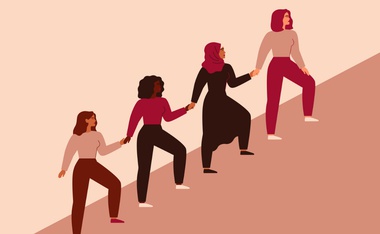The views expressed in our content reflect individual perspectives and do not represent the authoritative views of the Baha'i Faith.
In the early 1990’s, a young African woman seeking refuge from female genital mutilation found herself instead in an immigration prison in the U.S. – which did not yet consider flight from gender-based violence as grounds for asylum.
At the same time, a young law student – Layli Miller-Muro – felt motivated by her Baha’i Faith and its commitment to justice, and to the equality of women and men, to take the Togolese woman’s case.
Layli succeeded in changing the law at the highest immigration court in the land, joined in telling her client’s story to the world, and then founded the Tahirih Justice Center. Since then, over the past quarter-century that Baha’i-inspired NGO has accompanied many more women, children, and other survivors of gender-based violence in seeking justice and freedom.
The word “Tahirih” provided an exemplary namesake for the new non-profit: a celebrated 19th century Persian Baha’i poet, she fearlessly declared the emancipation of women in the East in the summer of 1848 at almost the same moment the Seneca Falls convention did so in the West, and later suffered execution for challenging a patriarchal society.
RELATED: Tahirih Justice Center Founder Urges Work as Worship
Now, 25 years later, the Tahirih Justice Center has opened offices nationwide and served over 35,000 immigrant survivors – among the most marginalized and least protected survivors of violence – seeking to secure their rights to justice, rebuild their lives in safety and dignity, and take leading roles as change agents.
The three of us work or volunteer at Tahirih, and we love how its Baha’i inspiration continues to drive its approach to social action and pursue meaningful social change.
In his writings Baha’u’llah, the prophet and founder of the Baha’i Faith, challenged all humanity:
If ye stay not the hand of the oppressor, if ye fail to safeguard the rights of the downtrodden, what right have ye then to vaunt yourselves among men? What is it of which ye can rightly boast?
Tahirih’s free legal and social services to obtain asylum and other protections attempt to answer that call. When current laws fail, we work to transform laws and systems. When enforcement fails, we train and educate police, court systems, lawyers, and others to provide trauma-informed access to safety and justice.
Helping survivors of gender-based violence free themselves from violence and inequality is grounded in the Baha’i teachings, as this speech given by Abdu’l-Baha in New York City in 1912 demonstrates:
The status of woman in former time was exceedingly deplorable … Baha’u’llah destroyed these ideas and proclaimed the equality of man and woman. He made woman respected … and that the man and woman share all rights.
Tahirih’s core values are also rooted in the Baha’i view of the oneness of humanity and our collective need to protect all members of human society for any of us to truly flourish. The Universal House of Justice, the democratically-elected administrative body of the world’s Baha’is, wrote:
The welfare of any segment of humanity is inextricably bound up with the welfare of the whole. Humanity’s collective life suffers when any one group thinks of its own well-being in isolation from that of its neighbours.
Tahirih’s logo and practice embodies the Baha’i principle of gender equality, as expressed by Abdu’l-Baha:
The world of humanity has two wings – one is women and the other men. Not until both wings are equally developed can the bird fly. Should one wing remain weak, flight is impossible.
Tahirih strives for a world where we see ourselves as one, where all are free from oppression. Tahirih is committed to justice, and to Baha’u’llah’s exhortation that “the purpose of justice is the appearance of unity …”
Just as important as what Tahirih does is how it does its work – by putting Baha’i principles into practice. Tahirih informs and formulates its strategy, policy, and service with extensive collaboration, client input and engagement. It follows Baha’i guidance that transformational social action is not a noblesse oblige project that one group of people carries out for the benefit of another, but one that builds capacity within all people to participate in creating a better world. We accompany our heroic clients in their quest for justice, and collaborate with grassroots community organizations, pro bono attorneys, volunteers, and social justice organizations for long-term institutional transformation. While we have earned a reputation for expertise and excellence in addressing gender-based violence, we collaborate with all stakeholders as part of the continuous learning essential for transformational change.
The Tahirih Justice Center is not a partisan organization. Baha’is abstain from partisanship, focusing instead on transcending differences, harmonizing perspectives, and considering everyone as a potential partner. By adhering to that approach, Tahirih has earned widespread trust and played an effective role in bringing together often rivalrous politicians in bi-partisan reforms, such as renewing the Violence Against Women Act, adopting federal laws to protect “mail order brides” from being sold into abusive marriages, and amending state laws to protect children from unwanted forced marriages.
RELATED: 5 Ways You Can Start Advocating for Women’s Rights
Within the organization, we implement Baha’i-inspired principles. We take the extra time for open-hearted, consultative decision-making that seeks diverse perspectives, benefits from the wisdom of the collective, and achieves equity and justice in outcomes, and for unlearning patterns of debate, ownership, and competition.
Baha’is consider eradicating racism to be America’s most vital and challenging issue, and its resolution a prerequisite to peace. Just as the Tahirih Justice Center recognizes that the oppression of women and girls often intersects with racism, Tahirih embraces anti-racist efforts to free ourselves from systems and unconscious attitudes that reflect and reinforce racial prejudice. We take this extra time not merely as best practice, but because Baha’u’llah counselled that “the maturity of the gift of understanding is made manifest through consultation;” and because of Baha’i guidance from the Universal House of Justice that humanity must abandon “the concept of power as a means of domination, with the accompanying notions of contest, contention, division and superiority …”
We hope that this unique Baha’i-inspired organization will continue to serve vulnerable communities for another fruitful 25 years, as well as inspire others to put into practice this Baha’i advice that we take to heart:
Be a treasure to the poor, an admonisher to the rich, an answerer to the cry of the needy … Be as a lamp unto them that walk in darkness, a joy to the sorrowful, a sea for the thirsty, a haven for the distressed, an upholder and defender of the victim of oppression … Be a home for the stranger, a balm to the suffering, a tower of strength for the fugitive …

















Comments
Sign in or create an account
Continue with Googleor